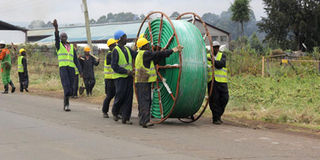Law to harmonise set-up of tech ducts in buildings, roads

Workers lay conduit ducts on the Njoro- Egerton Road in Nakuru on February 17, 2014. Developers would soon be required to incorporate basic ICT infrastructure in all commercial building plans before they are approved by the government. PHOTO | FILE
What you need to know:
- We want all stakeholders, for example, in road construction to be incorporated at the design stage to avoid damages to water pipes, power cables or data cables, the new legislation will give the framework for this.
- Currently, the deployment, maintenance and protection of critical infrastructure are not coordinated leading to disruption of essential services and losses due to random cable cuts.
- The new proposal will ensure that commercial building owners provide for technology infrastructure by setting up ducts required to install Internet connection.
Developers would soon be required to incorporate basic ICT infrastructure in all commercial building plans before they are approved by the government.
Road constructors would also be required to create fibre optic ducts to enable the laying of cables along the roads.
These are some of the proposals of an inter-ministerial task force charged with coming up with a law that would promote faster development of ICT infrastructure and protect existing installations.
The team was set up jointly by the Cabinet secretaries of Communications, Energy, as well as that of Transport and Infrastructure
The team is currently drafting the Critical Infrastructure Protection Bill.
The public has been invited to forward comments and suggestions through a consultative forum to be held at the Bomas of Kenya today.
ICT Authority’s Director for Programmes and Standards, Mr Paul Ronoh, told Smart Company that the draft Bill would promote the uptake of ICT through coordination of all government agencies involved in the construction industry, from the design to implementation.
LOSSES AND DAMAGES
“Lack of coordination for the various agencies has resulted to losses and damages caused when infrastructure is interfered with in one way or the other. We want all stakeholders, for example, in road construction to be incorporated at the design stage to avoid damages to water pipes, power cables or data cables, the new legislation will give the framework for this,” he said.
Kenya has embarked on numerous road construction projects with the relocation of power, sewer and water utilities said to be the most tedious procedure in the process, after land acquisition.
The new proposal will ensure that commercial building owners provide for technology infrastructure by setting up ducts required to install Internet connection.
Road constructors will allocate space for power and data cable installation before getting the approval for their work. Currently, the deployment, maintenance and protection of critical infrastructure are not coordinated leading to disruption of essential services and losses due to random cable cuts.
PUBLIC INPUT
“We live in the ICT age and the inclusion of ICT infrastructure will be made mandatory as the government provides the standards to be adhered to. The Bill should be ready for parliamentary approval early in the next financial year since we will require a second public input,” Mr Ronoh said.
The ministerial task force had been given two months to complete the process through a Kenya Gazette notice issued by the Cabinet Secretary, Ministry of Information, Communications and Technology.
Power and water supply interruptions are the most common during the construction of roads.
At the moment, the position of a Kenya Pipeline pump is said to be at the centre of a dispute between the parastatal and the Kenya Urban Roads Authority, which is undertaking expansion of the Outering Road, in Nairobi.





